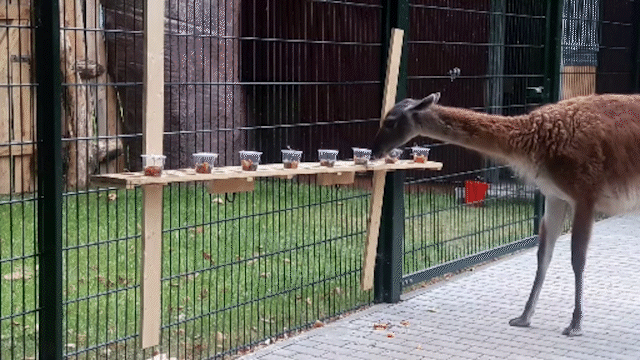Psychology
Why Nature-Based Therapy Is Gaining Traction Among Veterans
Spending time outdoors can reduce symptoms of depression and PTSD—growing concerns among service members
Great Apes Love to Spin Around—Here's Why
A recent study suggests that apes, like humans, seek out altered mental states
Outsider Animals May Be the Best at Solving Problems
Researchers tested whether hoofed mammals could retrieve food from a lidded cup, and those lower in the pecking order were the most successful
Spanish Athlete Emerges After 500 Days Alone in Underground Cave
Beatriz Flamini, 50, returned to the sunlight after more than 16 months of isolation
The Museum of Failure Celebrates Some of the World's Biggest Flops
Now on view in New York City, the traveling exhibition presents failure as a critical learning opportunity
Animal Personalities Can Trip Up Science
Individual behavior patterns may skew studies, but researchers have a solution to this problem
Adults Can Now Use Magic Mushrooms With Supervision in Oregon
State-certified facilitators will guide patients in hallucinogenic trips, which may help treat mental health conditions
The Ten Best Science Books of 2022
From a detective story on the origins of Covid-19 to a narrative that imagines a fateful day for dinosaurs, these works affected us the most this year
Cats React to ‘Baby Talk’ From Their Owners, but Not Strangers
New research provides evidence cats see their person as “more than just a food provider”
Can Experiencing Horror Help Your Brain?
The "recreational fear" that arises from visiting haunted houses and watching scary movies may provide psychological benefits
How Two California Artists Can Help Personalize Your Eco-Grief
Alicia Escott and Heidi Quante founded the Bureau of Linguistical Reality to create words to help describe people's feelings about climate change
Why Do Our Minds Wander?
A scientist says mind-wandering or daydreaming help prepare us for the future
Sleep Deprivation Could Make People More Selfish, Study Finds
Researchers measured charitable donations, looked at brain scans and conducted questionnaires to track changes in generosity
How Making Art Helps Improve Mental Health
With depression and anxiety on the rise during the pandemic, more professionals may adopt art therapy as a treatment
Getting 'Hangry' Is Real, Science Suggests
A new study explores the link between hunger and anger in the real world—and finds a connection
Can a Mental Health App Help You Deal With Anxiety?
Experts say the aids can be a first step to meaningful treatment if you choose an app based on three criteria
Beginning in Mid-July, Dial 988 for the Mental Health Hotline
The three-digit code will be like 911, but for mental health emergencies only
The Gay Asian Activist Whose Theories on Sexuality Were Decades Ahead of Their Time
In the 1930s, Li Shiu Tong's boyfriend, Magnus Hirschfeld, was a prominent defender of gay people. But Li's own research has long been overlooked
The Past, Present and Future of Using Ketamine to Treat Depression
The drug's initial successes have upended what many neuroscientists know about the brain and mental illness
Your Crushing Anxiety About the Climate Crisis Is Normal
A Stanford researcher shares what she’s learned about the ways climate change affects mental health and offers practical advice
Page 2 of 22
:focal(800x602:801x603)/https://tf-cmsv2-smithsonianmag-media.s3.amazonaws.com/filer_public/66/4c/664cb755-cd3c-45a5-befe-2172c7772332/dsc07312_web.jpg)
:focal(1500x1000:1501x1001)/https://tf-cmsv2-smithsonianmag-media.s3.amazonaws.com/filer_public/0e/69/0e690db9-8e69-41c7-990a-be0d61e09fc1/gettyimages-510754662.jpg)

:focal(2143x1388:2144x1389)/https://tf-cmsv2-smithsonianmag-media.s3.amazonaws.com/filer_public/5c/09/5c0925c6-d8f2-4485-907c-19bb987f707c/gettyimages-1251807947.jpg)
:focal(1001x839:1002x840)/https://tf-cmsv2-smithsonianmag-media.s3.amazonaws.com/filer_public/01/8e/018eb714-3629-4430-86f5-c05fa82ced08/new-coke.jpg)
:focal(800x602:801x603)/https://tf-cmsv2-smithsonianmag-media.s3.amazonaws.com/filer_public/64/0d/640d8a96-21c9-4f56-a1df-69fca51fae28/gettyimages-1084637590_web.jpg)
:focal(2784x1856:2785x1857)/https://tf-cmsv2-smithsonianmag-media.s3.amazonaws.com/filer_public/3d/4f/3d4fbad4-093a-4b50-8606-d8d5d58f4651/gettyimages-1151267673.jpg)
:focal(800x602:801x603)/https://tf-cmsv2-smithsonianmag-media.s3.amazonaws.com/filer_public/9e/69/9e69df77-49cc-47ac-8d24-8650e0e50d80/science-booklist-v1.jpg)
:focal(1061x707:1062x708)/https://tf-cmsv2-smithsonianmag-media.s3.amazonaws.com/filer_public/55/95/55958815-3a8a-4032-ac7a-ff8c8ec8898a/gettyimages-1067956982.jpg)
:focal(800x602:801x603)/https://tf-cmsv2-smithsonianmag-media.s3.amazonaws.com/filer_public/60/70/607009fa-2c22-49fd-b8c7-73c2cae5ff8e/23215853_1496136510472184_8111585426060032545_o-1_web.jpg)
:focal(1765x1177:1766x1178)/https://tf-cmsv2-smithsonianmag-media.s3.amazonaws.com/filer_public/ca/0b/ca0b790c-425e-428a-ae2e-886e90920206/img_9146_crop.jpg)
:focal(800x602:801x603)/https://tf-cmsv2-smithsonianmag-media.s3.amazonaws.com/filer_public/a5/8b/a58b6ad5-aabb-49b6-9565-941c9ce047f0/mind-wandering-1200px_web.jpg)
:focal(3135x2090:3136x2091)/https://tf-cmsv2-smithsonianmag-media.s3.amazonaws.com/filer_public/7d/51/7d516b19-1ad2-47a8-926f-6d87e4f70053/gettyimages-1262790546.jpg)
:focal(800x602:801x603)/https://tf-cmsv2-smithsonianmag-media.s3.amazonaws.com/filer_public/93/6b/936be10e-5770-4a93-ad2f-bdec3ada54ef/arttherapy-v1_web.jpg)
:focal(2666x1777:2667x1778)/https://tf-cmsv2-smithsonianmag-media.s3.amazonaws.com/filer_public/c5/3b/c53b8dae-457f-4f8c-a00a-4cef9708cc62/pexels-helena-lopes-693269.jpg)
:focal(800x602:801x603)/https://tf-cmsv2-smithsonianmag-media.s3.amazonaws.com/filer_public/e3/c4/e3c4938c-162f-44d0-9626-e94972cfdd62/mentalhealthapps-v1_web.jpg)
:focal(2500x1667:2501x1668)/https://tf-cmsv2-smithsonianmag-media.s3.amazonaws.com/filer_public/45/c4/45c47b5b-ba06-4158-acee-b717991b0944/pexels-adrienn-1458283.jpg)
:focal(557x360:558x361)/https://tf-cmsv2-smithsonianmag-media.s3.amazonaws.com/filer_public/99/40/99404d01-bedc-46e5-bfa2-6a816963df8a/world_league_for_sexual_reform_conference_b.jpeg)
:focal(800x602:801x603)/https://tf-cmsv2-smithsonianmag-media.s3.amazonaws.com/filer_public/ce/3e/ce3e7fdb-3d3d-42f9-8091-c510c003a15c/gettyimages-1304268015_web.jpg)
:focal(800x602:801x603)/https://tf-cmsv2-smithsonianmag-media.s3.amazonaws.com/filer_public/44/5c/445ca982-9efb-4620-855c-f681179088d6/gettyimages-1135956666_web.jpg)